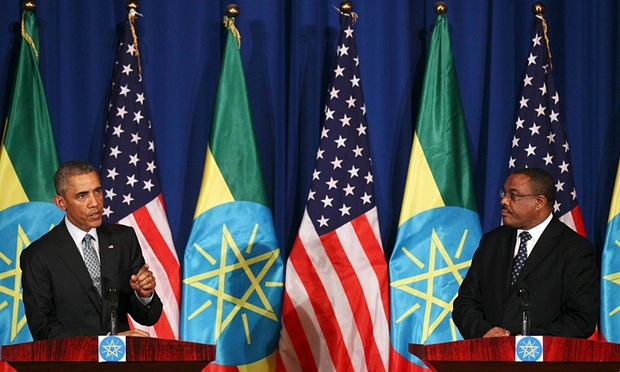Though human rights groups had called on Mr. Obama to use his visit to press for change, the president took a mild tone in his public remarks. He gently urged the Ethiopian government to make room for opposition, while stressing his respect for the country and its challenges in emerging from a long era of monarchy and autocracy.
President Obama in Addis Ababa, Ethiopia, on Monday, where he will convene a meeting to try to forge a peace in South Sudan.Obama, in Ethiopia, Addresses South Sudan
Voters in Addis Ababa, Ethiopia, reading newspapers ahead of Sunday’s election.
“We are very mindful of Ethiopia’s history, the hardships that this country has gone through,” Mr. Obama said at a joint news conference with Prime Minister Hailemariam Desalegn. “It has been relatively recently which the Constitution that was formed, and elections put forward a democratically elected government.” He added that “there is still more work to do, and I think the prime minister is the first to acknowledge that there is more work to do.”
President Obama with his national security adviser, Susan E. Rice, right, and Deputy Prime Minister Demeke Mekonnen Hassen of Ethiopia during a state dinner in Addis Ababa, Ethiopia, on Monday. Mr. Obama was being toasted by Prime Minister Hailemariam Desalegn. Credit Doug Mills/The New York Times
The elections in May were condemned by human rights groups as a sham. The government made it hard for opposition candidates to register, raise money and mobilize supporters, according to watchdog groups. Peaceful protesters were denied permits, harassed and in some cases arrested. News organizations were shut down and reporters harassed, threatened or arrested.
American diplomats were denied accreditation as election observers and prohibited from formally observing the process, according to the State Department, and the only international observers on the ground were from the African Union. The State Department said at the time that it was “troubled” that opposition party observers were barred from some locations.

“The recent election in Ethiopia was anything but a democratic one,” said Sarah Margon, the Washington director of Human Rights Watch. “There may not have been widespread violence or blatant ballot box stuffing on Election Day,” Ms. Margon said, but “the systematic repression of basic rights” made it “extremely unlikely that Ethiopians would feel safe enough to express themselves, particularly if that expression included criticism of the government.”
David J. Kramer, a former assistant secretary of state for democracy under President George W. Bush, said that Ethiopia has a “very repressive regime” in which opposition parties are not given a fair chance to compete. “To suggest otherwise is both to misrepresent the true state of affairs there and to demoralize those struggling to promote human rights and freedom in Ethiopia,” he said.
Even Mr. Obama’s national security adviser, Susan E. Rice, indicated at a briefing last week that the result of the election was not credible. “The prime minister of Ethiopia was just elected with 100 percent of the vote, which I think suggests, as we have stated in our public statements, some concern for the integrity of the electoral process,” she said.
When a reporter at the briefing asked her whether Mr. Obama thought that was a democratic election, Ms. Rice repeated in a sarcastic tone, “One hundred percent,” as if no further answer were necessary.
Trips to countries with repressive governments often present a challenge for Mr. Obama as he tries to balance other American interests against the promotion of democracy and human rights. Ethiopia has been an important partner in combating the Shabab, a ruthless Somalia-based affiliate of Al Qaeda. Ethiopia also has an important role to play in resolving ethnic conflict in South Sudan.
Mr. Obama is the first sitting American president to visit Ethiopia, and he defended his decision to come. “We don’t improve cooperation and advance the very interests that you talk about by staying away,” he said. “So we have to be in a conversation. And I think the prime minister will indicate that I don


